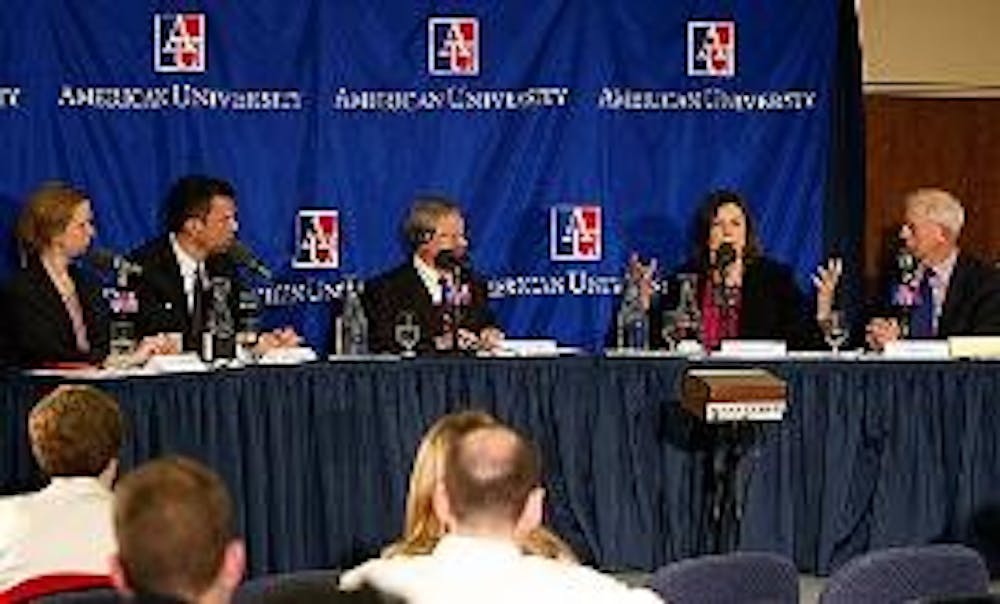The number of newspapers with D.C. bureaus has declined by half since 1985, School of Communication professor Wendell Cochran said during an American Forum Tuesday night.
| An American Forum: Washington Watchdogs |
The main question posed during the forum, which was also broadcast on C-SPAN and WAMU 88.5 FM, was if Washington watchdog journalists are "an endangered species," despite the fact that the U.S. government has doubled in size since 2001.
"The bigger picture here is that individual cities and towns no longer have a Washington presence," said panelist Suzanne Struglinski, senior editor of Provider magazine. "They're not going to get the detailed information on their delegations specifically [from] a bigger news organization or national network, [which are] not going to pay attention to it in the way that a local newspaper will."
Struglinski said members of Congress no longer have as much of a trusting bond with their constituents since there are fewer reporters covering their actions from a local angle.
Capitol News Connection founder and CEO Melinda Wittstock said "eyewitness journalism" was important and that it was essential for cities or towns to have some sort of D.C. presence.
"If you're not there, and you can't witness with your own eyes and ears what's going on, you can't possibly see the context with which events are unfolding," she said. "You can't tell whether a representative is the same person in Washington as they are back home. Trying to cover Washington from back home, from a local perspective, is next to impossible for that reason."
Another prevalent issue in Washington reporting is the decline of experienced Washington reporters who have confidential sources, according to Mark Whitaker, D.C. bureau chief and senior vice president for NBC News. He said he thinks the trend has negatively affected investigative journalism.
"The danger here is less in less overall information being available, because I think where you get that information has just shifted, and more specifically on what you lose when you have fewer veteran reporters who know how to get that confidential information," Whitaker said.
Despite the recent economic downturn and overall trend of media outlets firing reporters and cutting their coverage to save money, the panelists expressed some optimism for young journalists looking to enter the field of government reporting.
Wittstock said in a subsequent interview with The Eagle that she hopes students retain their enthusiasm for journalism, and added that there is a need for more journalists covering government now more than ever.
"If someone doesn't ask questions that matter, bad stuff happens," she said. "It's kind of like when you're a kid, I think of my son who's two-and-a-half, and when he picks up a little rock in the garden and looks underneath and all of the worms go 'ah!' because light has been shined on them and they prefer the darkness. That's kind of how I see the Capitol."
Whitaker advised students to learn as many multimedia skills as they could. Students who want to pursue government journalism shouldn't be too worried about finding jobs, since government is not going away and there will always be interest in the subject, but that the beat takes a long time to know well, he said in a subsequent interview.
"Making the investment in being here [going to school in D.C.] and really learning how government work is going to pay off in the future, because very few reporters really understand Washington, and people are going to always want to know how Washington really works from the inside," Whitaker said.
Pulitzer Prize-winner Tyler Marshall said in a post-forum interview that students who seek to pursue political journalism can expect more competition in the coming years - especially from bloggers.
"It used to be that you needed a big institution," he said. "Obama took a question from the Huffington Post, it won't be much longer before he'll take one at a presidential news conference from a blogger."
Cochran recounted his friend's reaction after they found out their state's delegation was not being covered by local media.
"You can't let [Congressional lawmakers] run around Washington without a chaperone," he said.
The American Forum occurs twice each semester and is sponsored by AU's School of Communication and WAMU. The next forum, set for March 31, is titled "Are the Media Making Us Dumber?"
You can reach this staff writer at thallerman@theeagleonline.com.





